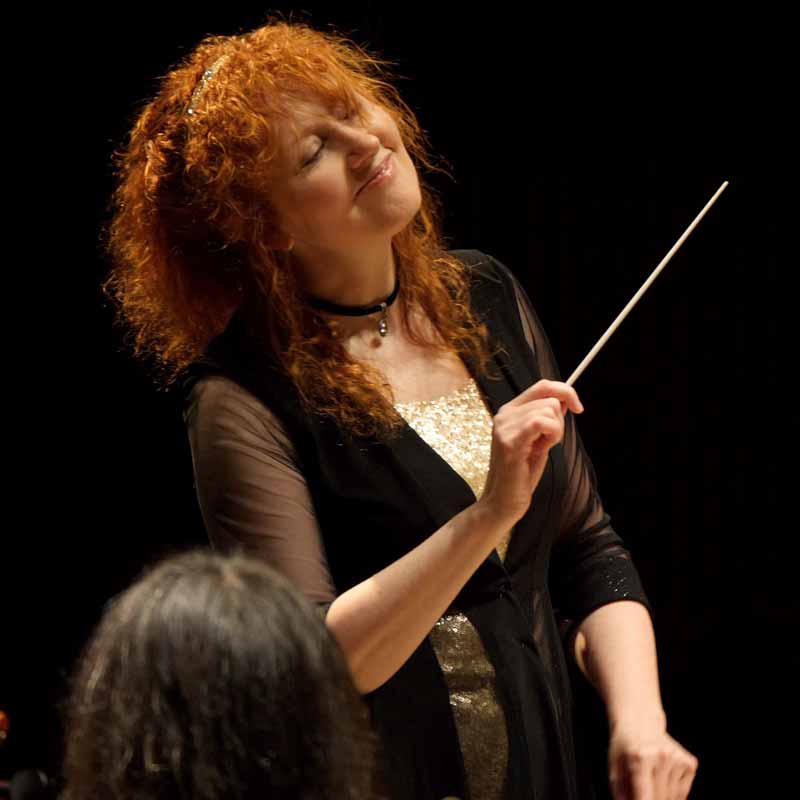by Jarrett Hoffman

•Interesting reads and announcements: a New York Times review of Jeannette Sorrell (pictured) leading Apollo’s Singers and the New York Philharmonic, the Knight Foundation’s Art + Tech Expansion Fund for Akron-based artists, and CWRU’s Think[box] innovation center
•Almanac: Elizabeth Sprague Coolidge, Peter Warlock, Franz Bruggen, and Emmerich Kálmán
INTERESTING READS & ANNOUNCEMENTS:
Following up on their Messiah collaboration in 2021, Jeannette Sorrell and Apollo’s Singers reunited with the New York Philharmonic last week at David Geffen Hall, this time for Handel’s Israel in Egypt.
In a review for The New York Times, Oussama Zahr praises the performances of Sorrell, the chorus, and the four soloists — soprano Amanda Forsythe, countertenor Cody Bowers, tenor Jacob Perry, and baritone Edward Vogel — while also pointing out the difficult and unexpected context of the performance, coming amid the Israeli-Hamas war:
Written almost entirely for choral forces, with few showpieces for the soloists, [the oratorio] narrates the Jewish exodus that Moses led from Egypt. To modern ears, the text painting of the 10 plagues is so lightweight that it verges on silliness: The orchestra leaps to depict frogs, buzzes for flies and thumps for hailstones.
Still, the melancholy-saturated lamentation that opens the piece, and the triumphant choruses that close it, adds substance. And on Wednesday, the conductor and Baroque specialist Jeannette Sorrell led a sonorous performance, drawing captivating singing from the choristers of Apollo’s Fire and intermittently inspiring the Philharmonic’s players to embrace fleeter, Handelian style on their modern instruments.
Read the review here.
The Knight Foundation’s Art + Tech Expansion Fund is awarding grants totaling $250K to Akron-based artists, arts collectives, and arts organizations “to broaden the reach of their work through the use of technology,” as Megan Becka writes for cleveland.com. The application deadline is November 3. Read the article here.
And speaking of art and technology, an article by Mandy Kraynak for The Land covers Case Western’s Think[box], an innovation center spanning seven stories and 50,000 square feet, making it “the largest open-access makerspace in the United States.” This past August, the center “opened a space for community members and organizations to host events, part of the university’s effort to share its resources with the surrounding community.” Read here.
TODAY’S ALMANAC:
by Daniel Hathaway
On this date in 1864 American music patroness and composer Elizabeth Sprague Coolidge was born in Chicago. Her generous advocacy for chamber music led to the founding of the Berkshire Music Festival in 1918, the precursor of Tanglewood, and she was responsible for the commissioning of a long list of important works for the Library of Congress, including quartets by Bartók, Britten, Prokofiev, Schoenberg and Webern, a flute sonata by Poulenc, and Copland’s Appalachian Spring. Click here to watch Demarre McGill perform the Poulenc sonata with pianist Michael McHale.
English composer Philip Heseltine, who used the nom de plume Peter Warlock — a nice touch for Halloween since he had a lively interest in the occult — was born on October 30, 1894 in London. A close friend of Delius since their boyhood at Eton, Heseltine was such a character that he appeared as himself in novels by such authors as D.H. Lawrence. “Classical Nerd” host Thomas Little devoted an episode to Warlock’s life.
Heseltine wrote musical criticism sporadically and composed a long list of songs and choral pieces significant for their eccentricity. Rumor had it that he attended an amateur choral society’s performance of his Three Carols in December, 1930, went home depressed, put the cat out, and gassed himself at the kitchen stove.
Listen to his popular carol Benedicamus Domino sung in 2013 by Quire Cleveland, and another carol, Bethlehem Down, performed by King’s College Choir. The latter resulted when poet Bruce Blunt and Heseltine decided to enter a newspaper contest for a new carol. They won, and had “an immortal carouse on the proceeds.”
On this date in 1934, Dutch flutist, musicologist, and virtuoso recorder player Franz Bruggen was born in Amsterdam. Click here to listen to him play his reconstruction of a Bach recorder concerto with the Orchestra of the 18th Century at the Amsterdam Concertgebouw. For an explanation of the piece, scroll down to read the comment by Skip Sempé.
And on October 30, 1953, Hungarian-born operetta composer Emmerich Kálmán died in Paris. Click here to watch a virtual Kálmán Festival “from the Merry Widow Vaults,” produced by Ohio Light Opera, who have championed his works in Wooster during their summer seasons.


